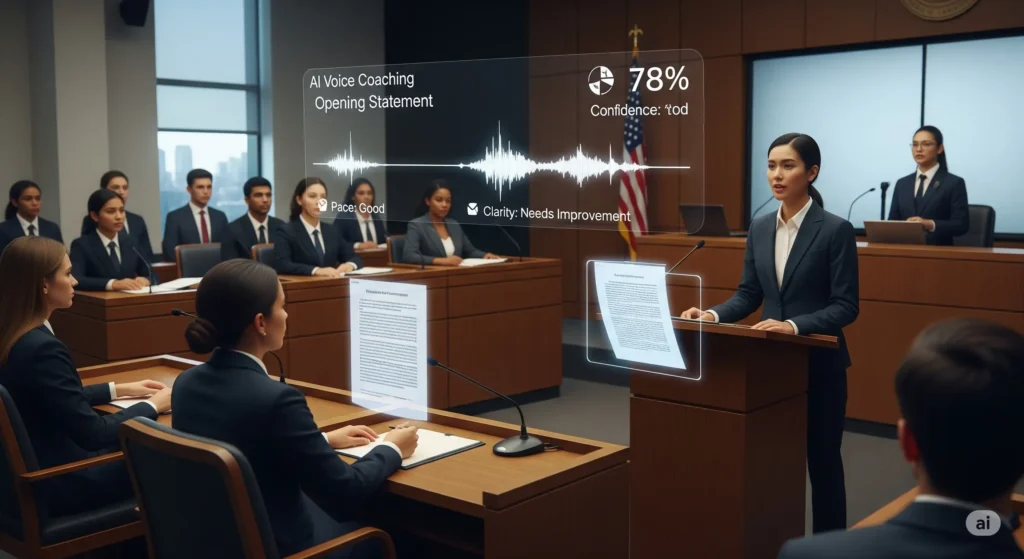Does your voice crack under pressure in mock trial situations?
You’re not alone. Even some of the brightest law students who know statutes off the top of their heads at times stumble in front of an audience. Their minds can be on point, but their voices tremble.
Public-speaking anxiety. Bad pacing. Monotone delivery. These aren’t just performance issues; they are what keep a lawyer from succeeding in an actual courtroom. And yes, even a simple mock trial coach can help out-but the coaching must sometimes be squeezed in, and feedback can be inconsistent and often biased.
Would it have been wiser to work smarter?
Imagine working on your presentation anytime you want to, getting instant, objective feedback, and tracking your improvements over the period, without the need for a live coach.
Exactly what AI legal training and voice coaching are putting together.
This emerging technology is ushering in a transformation not just for how students practice but for how they communicate, argue, and win in mock trials.
The Shift Toward AI Legal Training
Mock trials and courts for a long while were judged only by listening to a professor’s remarks, a coach’s viewpoints, or comments from other team members. Even though using these tools is helpful, they may look at things like how fast someone speaks, their mood, or if they can answer questions properly under stress.
AI legal training introduces technology in a way that supports lawyers and judges in court.
A survey carried out by the American Bar Association (ABA) recently discovered that over 45% of law schools in North America now employ AI for mock trial sessions, writing guidance, and practice in courtroom speaking.
Thanks to machine learning, speech analytics, and NLP (Natural Language Processing), these platforms help students quickly understand what they can do to boost their performance in demanding courtroom situations.
It’s not only about making things easier for customers. Equality, following the same rules every time, and getting ready are the basic aspects of it. Because of AI, all students can access ongoing input on their courtroom practice, unlike those students who may get only occasional help or suggestions from others.
Related: https://heyeve.ai/blogs/ai-in-legal-education/
What Is AI Voice Coaching in Legal Education?
AI voice coaching listens, evaluates, and assists in improving the way you deliver your speech before a court.
Rather than waiting to see the professor’s hand-written notes, law students now get instant feedback regarding their tone, pacing, pauses, confidence, and clarity at every practice session.
These tools use NLP to analyze your voice, how you speak, and see if you match the standards of persuasive speakers. Many tools also have:
- Feedback should include ratings on how clear the person is while talking.
- Finding out how emotional and tonal a piece of text is.
- Encouraging stronger language or organization.
It’s as if you have a dedicated courtroom coach with you at all times, who is always fresh and objective.
It lets students work on their arguing abilities as well as how others, both in court and among peers.
How AI Voice Tools Enhance Mock Trial Performance
A mock trial is not only about reasoning; it is largely about presentation skills.
That is where special AI voice tools excel.
When AI analyzes speech by sound patterns, typical mannerisms, and how sentences are put together, it can identify where students should make progress. Software like VoiceVibe and LegalSpeak AI can give immediate analysis of your writing.
- “This part was unclear because your voice dropped.”
- “You went too fast with each question in the cross-examination.”
- You added a pause before giving your counterargument. Keep that!”
Many students who try AI voice coaching for mock trials say:
- Using fewer “ums” and “likes”.
- Stronger performance when dealing with challenges.
- Better organization of answers provided on the spot.
At the University of Michigan, students getting AI help with their speech improved their courtroom delivery by 21% in only three weeks, without needing any additional coaching sessions.
The result? A student ready to speak confidently and regularly, handling real-life tasks well before graduation.
Related: https://heyeve.ai/blogs/ai-in-lawyer-training/
Key Benefits of AI Voice Coaching for Law Students
While AI in voice coaching is a modern addition, it addresses problems law students have every day.
Here are the biggest reasons:
Real-Time Feedback
You don’t have to wait for hours (or days) because the answer comes instantly with AI.
“Your speech is coming out too fast for me.”
“See if you can take a short pause here.”
“You do not sound very sure of yourself.”
As a result of the feedback, you can improve right away.
Practice Anytime, Anywhere
The clock is reading 11:30 PM. There is a mock trial for you in the morning.
On the field, you have no coach, and so your AI tool is here to help you.
This is what makes it great: help is offered all the time, no appointments needed, and no pressure.
Data-Driven Improvement
AI helps make your progress measurable and less guesswork.
You are given charts, scores, and playback tools to see how your results improve over the weeks.
Less Stress, More Confidence
Many people practicing a language out loud are afraid of being judged.
Because AI is personal, you can correct your mistakes and try them again whenever you need to.
A pilot study conducted in 2022 with Northwestern Law students showed an increase of 31% in their speaking confidence using AI feedback in just four weeks.
AI vs. Traditional Trial Coaching: What’s the Difference?
We can analyze it bit by bit:
| Feature | Traditional Coaching | AI Voice Coaching |
|---|---|---|
| Availability | Limited to scheduled sessions | 24/7, self-paced |
| Feedback Style | There is no single approach; coaching cultures change from one coach to another | Real-time, data-driven |
| Practice Environment | Public, occasionally overwhelming | Private, pressure-free |
| Tracking Improvement | Usually spoken and not always found on paper | Automatic performance metrics |
| Cost | Sometimes they are high-priced and only given for a short time. | Usually affordable/subscription |
Whether with the latest tech or not, each is useful on its own and even more powerful as a team.
Practice by using AI. Talk with your coach to get further insights.
Adoption of AI Voice Coaching in Law Schools
This is how teachers use AI to help students with speaking in class:
- In 2023, Harvard Law School started trials with the EdTech company, Lawlytics, for AI mock trial assistants.
- Trial Advocacy students at the University of Michigan Law now benefit from AI-powered voice evaluation.
- Students at Brooklyn Law School can practice their oral arguments by using VoiceVibe Legal AI tools.
And things are getting faster and more widespread. A 2023 report by Law.com found that 58% of law faculty believe AI coaching systems will be used widely in legal education within five years.
Law schools are aware that things are changing ahead.
They also want their students to deliver briefs well in both oral and written forms.
Suggested Read: https://heyeve.ai/blogs/ai-voice-assistants-in-legal-education/
Preparing Future Lawyers with AI-Driven Training Tools
Courts are evolving, and students who want to be lawyers must stay informed.
Being skilled in arguing the law is not the only role of a modern lawyer. Being clear and confident is very important for lawyers, especially during trials, depositions, or public hearings.
Those training tools powered by AI make learning much simpler.
Voice feedback platforms, virtual courtrooms, and speech analysis apps give students practice that benefits their daily communication.
According to a 2023 Bloomberg Law survey, 67% of legal employers now want to see their new hires feel at ease using AI for both research and talking with clients. It is no longer an extra—having data gives you an edge.
AI legal training has benefits now as well as in the future.
It involves teaching students how technology and law work together today.
Read Also: https://heyeve.ai/blogs/ai-training-chatbots-for-lawyers/
Challenges and Ethical Considerations in AI Coaching
Naturally, AI voice coaching doesn’t work for every need.
As with all strong tools, it also brings obstacles and major questions.
Bias in Training Data
An AI trained in a particular way of speaking might prefer a particular way of speaking, accent, tone, or language. They are sometimes unfairly penalized by this system.
Data Privacy Concerns
Voice recordings may be confidential. All school and developer employee systems need to securely store and never use student data without their consent.
Over-Reliance on AI
AI is something that can point you in the right direction, but not instead of a real mentor. Simply getting feedback from a machine might restrict a student’s style.
Therefore, leading law programs see AI as a tool to strengthen counseling, rather than to replace it.
Technology doesn’t work well unless it is guided by thoughtfulness, sensitivity, and an ethical foundation.
Are you prepared to update your mock trial interviews?
Give yourself AI voice coaching resources to help you become more self-assured and presentable in court.
Contact Us!
Conclusion: The Future of AI Legal Training Starts with Voice
Speaking clearly and forcefully is what helps you win cases in court.
How you deliver your words is equally as important as the words themselves in any type of court case.
AI voice coaching is helping law students improve their speaking skills more than ever before.
Thanks to feedback on the spot, availability around the clock, and improvements guided by data, it is transforming legal education and future lawyers’ presence in society.
This means such law schools teach more than only case law.
The foundation is creating confident communicators ready to meet the technology-based demands of today and the future.
Because future generations of legal professionals may benefit from their example.
They won’t limit their role to writing the law.
They’ll sound like pros, and they’ll be speaking via AI.


